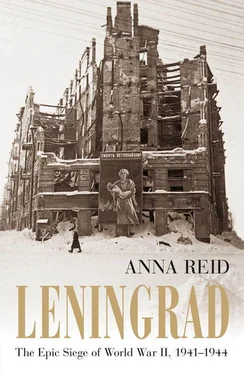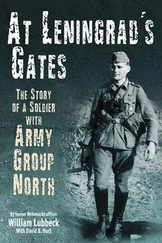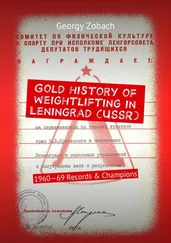Leningraders should have been better prepared for the Second World War—the Great Patriotic War as they still call it—than other Soviet citizens, because they had had ringside seats at its prequel. Following the Nazi—Soviet pact of August 1939, the Soviet Union had occupied not only eastern Poland, but also, in June 1940, the Baltic states to Leningrad’s west, and the lake-fretted southern marches of Finland, directly to its north.
The ‘Winter War’ with Finland in particular provided a foretaste of travails to come. The war was launched on 30 November 1939, three months after the invasion of Poland, and Russians expected it to be very short. ‘[We thought that] all we had to do was raise our voice a little bit’, remembered Khrushchev, ‘and the Finns would obey. If that didn’t work we would fire one shot and they would put up their hands and surrender.’ {4} 4 Edward Crankshaw, ed., Khrushchev Remembers , London, 1971, p. 135.
In fact the war proved a humiliation. Despite their tiny numbers—a population of 3.7 million compared to the Soviet Union’s almost 200 million—the Finns put up a dogged defence, forcing the Russians to send in overwhelming numbers of troops. When the Soviet Union finally pushed Finland into surrender on 12 March 1941, annexing its second city of Viipuri (today Russia’s Vyborg) and the whole of the isthmus between the Gulf of Finland and Lake Ladoga, it was at the cost of 127,000 Red Army fatalities. Via the rumours that leaked out of the military hospitals, Leningraders got their first intimation of the army’s weaknesses in leadership, equipment and training. Soldiers lacked weapons, ammunition, winter clothing and camouflage (‘We couldn’t have been offered a better target’, reminisced a Finnish fighter pilot of a column of troops crossing a frozen lake. ‘The Russians weren’t even wearing white parkas.’) Most of all, they lacked good officers, thanks to Stalin’s paranoid evisceration of the armed forces during the recent Terror. From 1937 to 1939 an extraordinary 40,000 officers had been arrested, and of those about 15,000 shot. Among them were three out of the five Marshals of the Soviet Union, fifteen out of sixteen army commanders, sixty out of sixty-seven corps commanders, 136 out of 169 divisional commanders, and fifteen out of twenty-five admirals. The survivors (44 per cent of whom had no secondary education) were mostly blinkered veterans of the Civil War or overpromoted juniors too afraid of tribunal and execution squad to take the initiative or to adapt their orders to changing circumstances. {5} 5 Harold Shukman, ed., Stalin’s Generals , pp. 2, 319–20.
The mistakes of the Winter War were repeated so exactly during the first months of the German invasion that with hindsight it resembles a warm-up for the main event. It certainly seemed that way to Finns, who still call the Second World War—during which they helped to besiege Leningrad but refused directly to attack it—the ‘Continuation War’.
In practice, though, for Leningraders as for most ordinary Russians, the first twenty-two months of the Second World War had seemed rather distant. ‘Somewhere in Europe a war was on’, one Leningrader remembered, ‘for a couple of years now—so what?… It wasn’t considered appropriate to worry about international events, to exhibit, as they used to call it, “unhealthy moods”.’ {6} 6 Solomon Volkov, St Petersburg: A Cultural History , p. 425.
Though the Finns had fought doggedly, the campaigns in Poland and the Baltics had been quick and easy. Hitler’s rampage across France and the Low Countries in the spring of 1940 had moved Western-read intellectuals such as the poet Anna Akhmatova, who wrote unpublished verses mourning the fall of Paris and London’s Blitz. But most believed the street-corner loudspeakers, the notice board ‘wall newspapers’ and the agitators at the endless workplace meetings, who told them that the capitalists were tearing each other apart, leaving the Soviet Union ready to snap up the leftovers. Though the treaty with Hitler was only temporary, any war with him would be fought on German soil and be over almost before it had begun, brought to a halt by popular revolution inside Germany itself. Hearing of the Nazi attack, workers at the Leningrad Metal Factory exclaimed, ‘Our forces will thrash them; it’ll be over in a week. No, not in a week—we’ve got to get to Berlin. That’ll take three or four weeks.’ {7} 7 G. Kulagin, Dnevnik i pamyat: o perezhitom v gody blokady , Leningrad, 1978, p. 17. Notes to Pages 14–28.
Even sophisticated observers, able correctly to interpret Hitler’s April invasion of Yugoslavia (in defiance of a Soviet—Yugoslav friendship pact) and Churchill’s warning speeches, were shocked when what they had feared actually came to pass. For Olga Fridenberg, a classicist and first cousin to Boris Pasternak, ‘It wasn’t the invasion that was incredible, for who had not expected it?… It was the upheaval in our lives, their sudden cleaving into past and present on this quiet summer Sunday with all the windows wide open.’ {8} 8 Elliott Mossman, ed., The Correspondence of Boris Pasternak and Olga Freidenberg, 1910–1954 , p. 203.
Famously, the Soviet leadership was caught by surprise as well. ‘Stalin and his people remain completely inactive’, Goebbels confided to his diary a month before the invasion, ‘like a rabbit confronted with a snake.’ {9} 9 Evan Mawdsley, Thunder in the East: The Nazi-Soviet War 1941–1945 , p. 8.
Though historians still debate the rationale behind Stalin’s pre-war foreign policy, it is clear that Stalin both expected war with Germany and convinced himself that with appeasement it could be delayed at least until the following year. Reports from the Soviet ambassador to Berlin were ignored, as was military intelligence of troop concentrations west of the new German—Soviet border. British warnings were dismissed as disinformation, designed to turn the Red Army into ‘England’s soldiers’. Notoriously, the trade commissariat continued to send grain, petroleum, rubber and copper to Germany right up to the very night of the invasion.
Stalin’s plenipotentiary in Leningrad at the outbreak of war was Andrei Zhdanov, a plump, sallow-faced, chain-smoking son of a schoolteacher who had risen to be Party Secretary of Gorky (formerly and now again Nizhni Novgorod), thence to the Central Committee, and after the murder of Leningrad Party boss Sergei Kirov (probably at Stalin’s hands) in 1934, to leadership of the Leningrad Party organisation and full membership of the Politburo. Devotedly loyal, and like Stalin a workaholic autodidact, he was one of the few people Stalin addressed with the familiar ty —equivalent to the French tu —rather than the formal Vy . Today he is best remembered for leading Leningrad’s defence and for a tragic-comic post-war stint as cultural commissar, during which he denounced Akhmatova as ‘half-nun, half-whore’, and tinkled politically correct tunes to Shostakovich on the piano. In truth, he was a mass murderer: as well as overseeing the Leningrad purges of 1937–9, he had, like other Politburo members, toured them to the provinces—in his case, to the Urals and Middle Volga. His signature, together with Stalin’s and Molotov’s, is to be found at the bottom of dozens of death lists.
Like Stalin, Zhdanov was so confident that talk of an imminent German attack was premature that on 19 June he left Moscow for a six-week break at the Black Sea resort of Sochi. ‘The Germans have already missed their best moment’, Stalin reassured him. ‘It looks as though they will attack in 1942. Go on holiday.’ Through the afternoon of Saturday 21 June, as Zhdanov settled in at the seaside, the border guards’ usual trickle of unsettling reports turned into a torrent: of yet more incursions into Soviet airspace, of covert movements of tanks and artillery, of pontoon bridges being built and barbed-wire entanglements cleared away. Shortly after nine in the evening, three deserters—a Lithuanian and two German Communists—crossed the River Bug to Soviet lines, and told interrogators of the orders that had just been read out to their units. The attack would begin at 0400, said the Lithuanian, and ‘they plan to finish you off pretty quickly’. {10} 10 John Erickson, The Road to Stalingrad: Stalin’s War with Germany , vol. 1, p. 105.
Читать дальше











